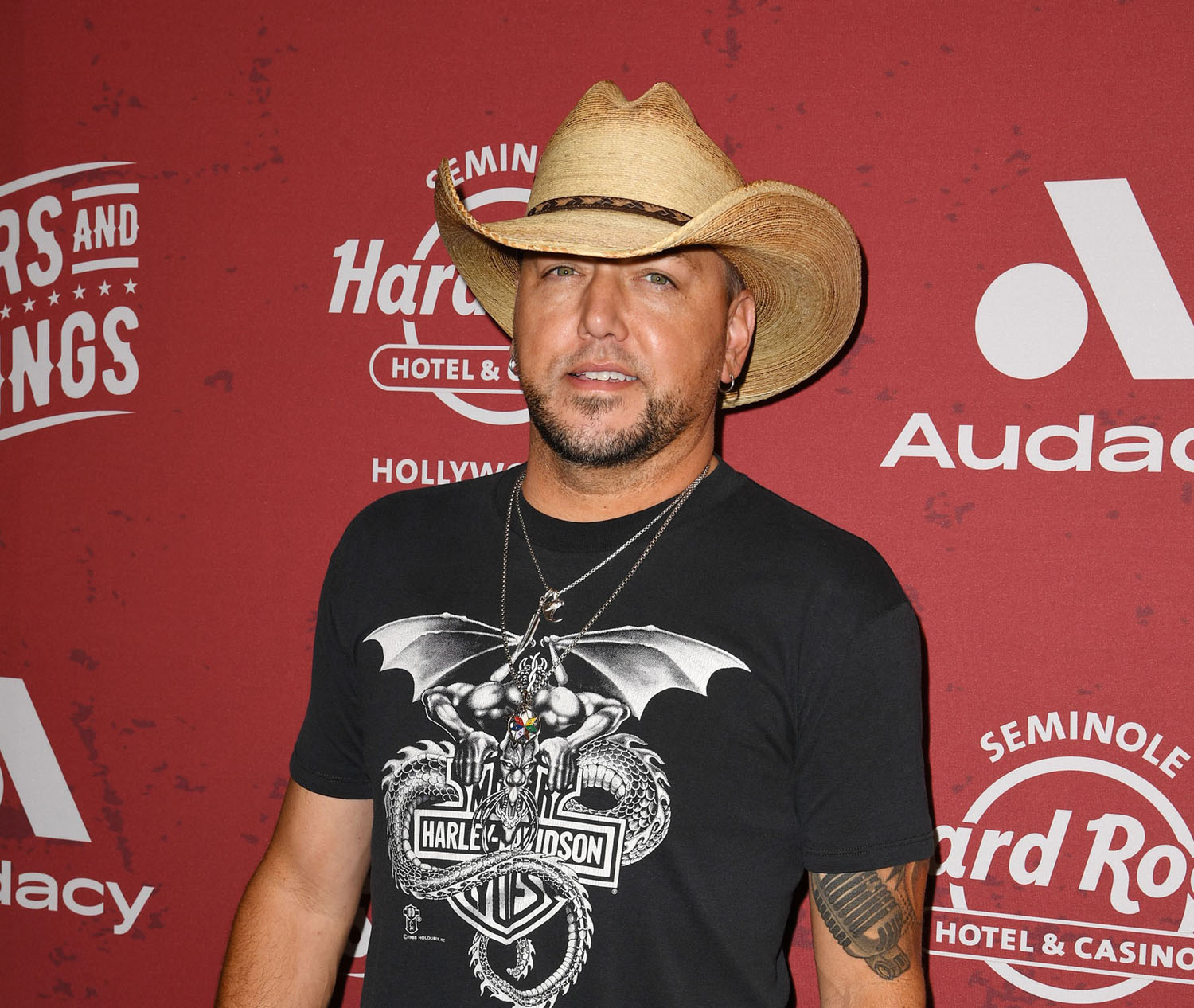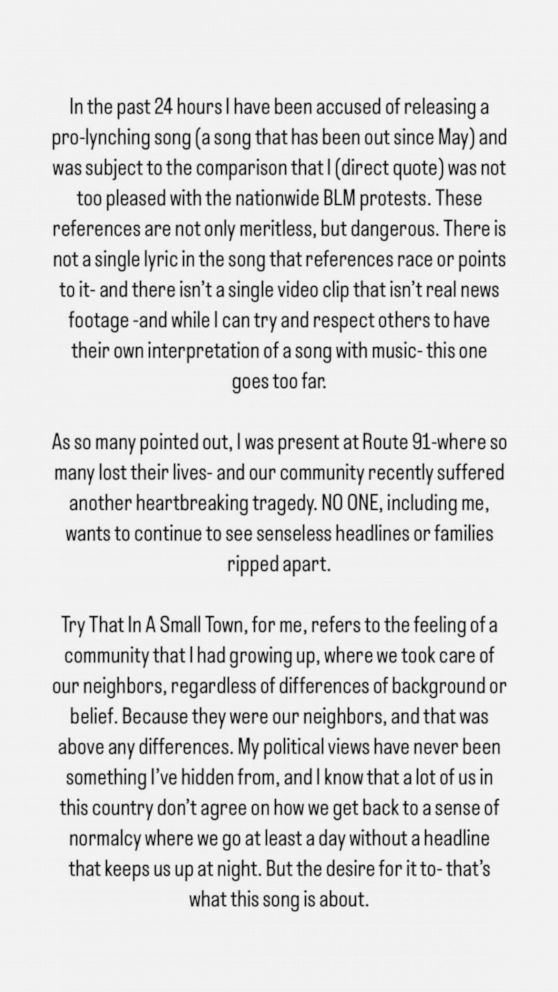Jason Aldean's propaganda got pulled



This week, Billboard reported that CMT made a huge move, pulling Jason Aldean’s controversial new music video for his song, "Try That In A Small Town", from its rotation after its release on Friday.
Despite the song being released back in May, the accompanying music video became a hot topic on social media in recent days, with its nods to sundown towns, as people pointed to the pro-lynching dog whistling in the lyrics, saying it evoked vigilantism and racism.
The song and video are, essentially, a threat to city slickers and people who are likely to fight or protest for social justice causes. Or anyone that may not look like they belong in a small town - we know what that means. With lyrics that read, “Cuss out a cop, spit in his face / Stomp on the flag and light it up / Yeah, ya think you’re tough / Well, try that in a small town / See how far ya make it down the road / Around here, we take care of our own,” he’s quite literally challenging people to try behaviors he is associating with that of protesters in a small town.
Jason took to social media to defend himself against these claims as the video was pulled from CMT’s rotation, releasing this statement on both Instagram and Twitter:

In his statement, he’s adamant that all he’s done is used real news footage. Some of the footage featured throughout the music video is, in fact, from actual news clips. But a TikTokker named Destinee Stark did a deep dive on the origins of some of the footage and found that some of the clips are literal stock videos shot outside North America in places like Germany and don’t actually depict protests at all, but celebrations. So he’s misappropriating footage to help spread his message of small town superiority and telling people it’s from news programs. In other words, it’s propaganda.
He also points out in his statement that there’s no explicit mention of race. He’s correct about that. No mention of race, skin colour, religion, ethnicity, or anything of the like. But does there need to be? If Jason thinks for one second that the implications of the video aren’t laid bare for the swaths of people who are in the business of reading between the lines, and also, doing research, he’s mistaken.
Critics had a field day online pointing out the dog whistles throughout the song. Destinee highlighted some of what she noticed throughout the song in this video, which racked up nearly two million views. There were enough dog whistles in the lyrics and video for her to create a five-part series on that alone, and a slew of other videos responding to the racist trolls who flooded her comment section.
@destineenstark The dog whistles in this song are legit WILD. 😳 #jasonaldean #countrymusic #trythatinasmalltown #fyp
♬ original sound - Destinee Stark
Perhaps the most obvious dog whistle, though, is the location where the music video was shot. Despite being from Macon, Georgia, where the population sits at just under 160,000, much larger than what most would deem a “small town”, his team decided to shoot the music video in Tennessee, which happens to be the birthplace of the Ku Klux Klan, in front of the Maury County Courthouse. It’s the same courthouse where a white lynch mob hung a young Black man named Henry Choate from the second floor of the courthouse, the exact spot where an American flag is hanging in the video, after dragging him behind a car for a few blocks in 1927. And the implications don’t stop there.
He mentioned the “good old boys”, a term used to refer to traditional, southern U.S men with conservative values. He sings about the gun that his grandfather gave him, again, professing his long-standing support of gun ownership in the U.S.
But these lyrics didn’t seem to sit well with people who were quick to point out that the deadliest mass shooting in American history took place during his performance at the Route 91 Music Harvest Festival in Las Vegas back in 2017, where 58 people were killed and more than 400 were injured.
In addition to that, people shared resources that highlight that most mass shootings actually take place in the exact places Jason is touting in his song – small towns. According to this 2018 article, of the 10 deadliest school shootings in the U.S., nine of them took place in a town with fewer than 75,000 residents and most of them were in cities with less than 50,000 people. Again, his song is very propagandizing in nature.
Despite his attempt at quelling some of the uproar about the video, it was a pretty huge move for CMT to ultimately pull it. As I mentioned, the song itself was released back in May, but the attention generated from the controversy surrounding the lyrics to the song saw it skyrocket to number one on the U.S. iTunes chart around the time it was pulled. So CMT is making a bold statement - the network doesn’t care if your song is number one. They will pull it.
According to Chris Willman, the Senior Writer and Chief Music Critic at Variety, it’s the first time this has happened, that he can recall, at least.
“I can’t remember a time, at least in the last 30 years, where a video got yanked because suddenly there was an uproar,” he told ABC News.
The point the network is making to country artists is that it’s not okay to make music like this anymore. Not if you’re expecting mainstream success. Men like Jason Aldean and Toby Keith, whose song “Beer For My Horses” has also come up in the discussion over its explicit mention of gathering all the rope in Texas to hang “bad boys” from tall oak trees, shouldn’t expect their songs to play on CMT.
I’ve written before about the toxic and racist culture of country music, despite my own complicated love affair with the genre. In the undertone of all my writing has been the hope and optimism that the tides are changing. And CMT has breathed life into that hope and optimism in pulling this video.
Prominent gun control activist Shannon Watts spoke out on social media on Tuesday, saying she was “proud to have had a hand” in CMT pulling the “racist and violent song”.
Proud to have had a hand in getting CMT to reject this racist and violent song… https://t.co/6siOWPcYHM pic.twitter.com/vTMQFxNXOQ
— Shannon Watts (@shannonrwatts) July 19, 2023
It’s unclear whether the song was pulled for the racial implications throughout the song or over gun safety concerns, perhaps it was both. But I’m sure Jason’s history with blackface and his wife’s history with professing her transphobia didn’t pad his case. CMT making the decision to pull it is telling artists like Jason Aldean something. That there is no place for that kind of rhetoric in country music. Not anymore, at least.

